- Home
- Scott Chapman
The Templar Key, By Number One Author (Peter Sparke Book 3)
The Templar Key, By Number One Author (Peter Sparke Book 3) Read online
The Templar Key
Scott Chapman
Copyright © 2014 Scott Chapman
KINDLE Edition
All rights reserved, including the right to reproduce this book, or portions thereof in any form. No part of this text may be reproduced, transmitted, downloaded, decompiled, reverse engineered, or stored, in any form or introduced into any information storage and retrieval system, in any form or by any means, whether electronic or mechanical without the express written permission of the author.
This is a work of fiction. Names and characters are the product of the author’s imagination and any resemblance to actual persons, living or dead, is entirely coincidental.
PublishNation, London
www.publishnation.co.uk
Motorcyclists
The two figures sat, motionless on their machine, shrouded against the biting wind. The sky was a solid grey ceiling of rolling clouds, and the weak light turned the world into monochrome. Only a few stunted trees, twisted by the constant wind, broke up the barren landscape.
The rider of the motorcycle wore a heavy trench coat which enveloped him from his chin to his knees. A thick tweed cap was pulled down close over his eyes and the hands that rested on the handlebars were protected by heavy, but beautifully crafted, gloves.
The man seated in the motorcycle’s sidecar was obviously older, but there was something else, immobility in his posture, that marked him out.
Both had rifles, not hunting guns, but military weapons, and they peered along the rough road to the north. They watched as a few dark dots moved in the distance and gradually grew in size until they could be made out as men. Neither man stirred as the antlike figures slowly emerged from the broken wilderness.
Six men gradually approached, some plainly limping. They were moving so slowly that it took them an hour to reach the motorcyclists. They had a look of total exhaustion as the freezing wind whipped their tattered clothes about them. They were wearing the filthy remnants of army uniforms, but none were carrying weapons. They stopped when they reached the motorcycle, but none of the men were able to speak, certainly none knew where to begin. For long moments, the only sound was the harsh wind and the ragged breathing of the men.
“Who are you?” said the young motorcyclist, in a polite, but offhand way. His voice had the clear diction and lazy confidence which comes from having a life’s experience of being in control of any situation he found himself in.
“Artillery,” said one of the soldiers. Of the six, he was the only officer. His uniform was smarter than the others and his belt held a holster, but it contained no pistol.
“Where is the rest of your regiment?”
The young officer tried not to choke. “Gone. The Army is destroyed. They were everywhere. They killed our colonel and his staff with their bayonets.”
The motorcyclist dismounted and brought over a metal canteen, which he passed to the nearest soldier.
“Where are your weapons?”
The young man raised his arms and let them fall to his side.
“Lost, everything is lost.”
“You have no pistol.”
The young officer looked down at his empty holster, looked back at the motorcyclist and simply nodded.
“Did you drop it somewhere?”
Again the young officer made no reply, but stared at the motorcyclist.
“An officer needs a weapon,” the motorcyclist said as reached into the sidecar of the motorcycle. He pulled out the Lee Enfield rifle, checked that it was loaded and then handed it to him. The young man was no longer an army officer. He was a boy in the tattered remnants of a uniform. The gun looked comically out of place in his hands and he looked close to tears. For a moment the motorcyclist looked at the group of men, and then he casually took the rifle back. The young officer made no move to keep it.
“Move quickly and don’t stop. You will be in the city before dawn,” said the motorcyclist to the officer.
Behind the group of men, the horizon was split by trails of smoke. To the motorcyclist, it appeared that everything that was not made of stone was burning. A furious enemy was coming towards the city and nothing was going to stop it.
To The Knight Commander of the Order of Knights Templar at Smyrna
This letter is for the hand of the Commander of the Order of the Knights Templar in their House at Smyrna.
You should know that some of the pilgrims who came up from the coast were badly injured and robbed of all they possessed. Thanks be to God that all but two of them survived this time and those who died were not of any note. This party of pilgrims was protected by the Grace of God. Many have not been so blessed crossing these hard lands.
This winter has been cruel. Crops rotted in the fields with the summer pestilence and the people of the hills have been eating their animals to live. They come to us for food, but the little we have is barely enough for ourselves and to feed those who make pilgrimage. We must turn away many poor wretches.
Some of the villagers have left the land and have turned to robbery. Hunger has made wolves of these peasants and even this House has not been safe. Our walls have been scaled and two of our brothers killed in attacks.
The people who come from the country of the interior are now seen every day and they show no respect to ourselves or the few pilgrims who still travel the road to Jacob’s Column. They take what they want and have made whole villages their own, turning the people out to the winter.
We pray that you and your brothers of the Order see your Christian duty and bring to our House, and our pilgrims, the protection of your swords.
Your Order is known throughout the world for its devotion to God’s work and to the destruction of His enemies. There are enemies all around us now and they will soon overwhelm us and destroy the shrine.
Buckle on your armor and take up your sword. There is God’s work to be done in the slaughter of His enemies. Make haste, or the spring will find our most ancient House to be a home to only corpses.
From the hand of the Abbot of the Monastery of Jacobi.
Letter to the Abbot of the Monastery of Jacobi
For many months we have protected those who make the pilgrimage to the shrine at Jacob’s Column. Those with whom we ride see no harm or hurt when we are with them. Those who travel alone are beyond our help and at God’s mercy.
Many times we have found those who have been preyed upon by robbers and many times we have pursued the wrongdoers, but we are dogs chasing crows. We are small in number and have many obligations.
Funds have been made available to bring peace to your House and the road to the Shrine of Jacob’s column. We will bring a lasting peace.
We will deliver this peace and wield His sword with God’s guidance. He will protect those whom he loves.
From the hand of the Commander of the Knights Templar in Smyrna
The old Abbot held the pieces of parchment in his hands and was unable to stop them shaking as he looked at the man who had brought them to him. The first document had been his own plea for help to the Master of the Order of the Knights Templar on the far away coast. The second, his response, brought to him by the knight who stood before him.
“What will you do?” said the Abbot.
“Bring peace,” said the Knight.
“How?”
“By delivering God’s justice to those who bring harm to you and to the pilgrims.”
“You will attack them?”
“No, we will not run into the hills chasing these people. We have other ways of dealing with these problems.” The Abbot looked at the faint light from the l
amp reflecting on the armor the knight wore and the sword that hung from his belt.
“May God have mercy on their souls,” he said, laying down the letters.
Have you ever been to Turkey?
“Ever been to Turkey?” said Tilly, her voice echoing over the phone.
“Two days of meetings at an airport hotel. Does that qualify?” said Sparke. “Why?”
“Just had a meeting with a lady from Australia who’s determined that you should go.”
For a man who spent his life managing crises and disasters around the world, Peter Sparke had an unusually strong dislike for the unexpected. He liked his surprises to come in large doses, or not at all. Having an oil rig explode or a mine collapse were issues he could cope with, but finding that someone else, somebody he had never heard of, was trying to plan his activities irritated him.
“What is she asking about me for?” he said. “Does she think we work together or something?”
“You won’t speak to her. When her people call you, you tell them that you don’t talk to the media and hang up.”
“Ah, she has ‘people’ and she’s a media person. Two strikes. I hang up on media people now. Only way to stop them.”
Sparke had never sought fame, but twice in the recent past he had been at the center of discoveries that had created a frenzy of media interest. He stubbornly tried to hang on to his normal life by refusing to talk to any journalists.
He first came to public attention when he had, with help from Tilly, or Professor Matilda Pink as she was more properly known, uncovered a lost vault in the Scottish Highlands containing the final emergency treasury of the Order of the Knights Templar and a cache of some of their most valuable relics. Included in this cache was an ancient stone chest which many world experts were willing to verify was the renowned Ark of the Covenant. Sparke had been so scarred by the media storm that erupted that he had avoided all activity connected with the Templars ever since and tried to bury himself in his job.
It was a job he liked. He was now the CEO of a crisis management company that had recently been spun off from its parent company. The sudden fame he had received from uncovering what was now known as ‘The Templar Vault’ had almost cost him his job as the firm’s German owners avoided unplanned publicity like the plague.
“Did you tell her to get lost?” he said to Tilly.
“Yup, several times, but she never batted an eye.”
“I know I’m going to regret asking, but why does she want me to go to Turkey?”
“Us, she wants us to go to Turkey.”
“Let’s start with the idea that we are not going to Turkey, but explain why she thinks we might be willing to go?”
“It seems legit. She’s asked me to carry out some perfectly reasonable research for a television program her company wants to make and she’s willing to pay a silly amount of money for it. But there’s a condition.”
“And that condition involves me going to Turkey?”
“Yes. She’s keen to talk to you.”
“She can be as keen as she likes. I’m not doing any media nonsense.”
“That’s the thing. She knows that media is not your cup of tea, so there is no media involvement for you at all, just a meeting with her.”
“Why does she think I would want to schlep over to Turkey just to meet her?”
“I assume she thinks you might go if I asked you,” said Tilly, “but I told her you wouldn’t.”
“Since I won’t be going, there’s no harm in knowing what she wants to talk about, just for curiosity’s sake.”
“Her company is making a program about her own family’s connections to a site which she believes has strong links to the Knights Templar.”
For a moment, Sparke was silent.
“I am absolutely certain that there were no Knights Templar in Australia, although I’m not a historian, so I could be wrong. Why does she think I can be of any value?” he said.
“That, she won’t say, but she is willing to fund a reasonable research project in return for a private meeting with you. All expenses paid, of course.”
Tilly had become something of a celebrity herself following the discovery of the Vault. She had been the first qualified person to enter it and had been heavily engaged in cataloguing the contents on behalf of the Scottish government ever since. Sparke had managed to injure himself badly during the escapade and she had, in all probability, saved his life by guiding the mountain rescue team to his location, where he lay unconscious on the side of a winter mountain in the Scottish highlands. This was a debt that Sparke was deeply aware of. Too big a debt to even recognize. If Tilly asked him for a favor, he would hate to lose a chance to pay off some of that debt. This did not, of course, make him want to tangle with an Australian media woman.
“What makes her believe her family has any connection to the Knights? Is this some crank thing?”
“Oh no,” said Tilly, “that part seems quite solid. She has some documentation that does seem to stack up. The link exists, but as to whether or not it has any value, is another matter.”
“OK, what’s the link?”
“It’s quite an interesting little niche area of medieval research, actually. Let me get my file.” Sparke heard her put down the phone. In his mind’s eye, he could see her walk over to the rack of shelves where her files were neatly arranged in color-coded sections.
She picked up the phone. “Until about 1922, her family owned a piece of land in what is now modern Turkey. The land contained the site of a medieval Christian pilgrimage shrine of some importance. The shrine and the pilgrim trail to it were under the particular care of the Knights Templar.”
“What is the research project she wants you to do?”
“There are some local legends about the place that she wants to dig into, and if there’s anything there, to make a program about it for her television channel.”
“She owns a channel?”
“Oh yes. Quite well-known in Australia and in the U.S., as well,” said Tilly. “Documentaries mainly, bit of travel, that sort of thing.”
“Would this mean that you would be a television star?” said Sparke.
The joke seemed to touch a nerve.
“This is a research project, Peter,” she said. “Although, if I was to end up doing a wee bit of presenting to the camera, I could probably live with that. I mean, why not me?”
“Look, Tilly, I can see why this would make sense for you to get into and if I can help, then I will. But, one thing is for certain: I am definitely not going to Turkey just because some woman I have never heard of whistles for me.”
Still be friends
As the Turkish Airlines Airbus A330 began its decent into Istanbul, Sparke and Tilly started to tidy up the mess of newspapers, empty water bottles, and general detritus that seems to accumulate on any flight lasting more than a few minutes. Sparke sometimes wondered if the Wright brothers had dismounted from the first flight of their Kitty Hawk aircraft amidst a cascade of newspapers, biscuit wrappers, and crumpled copies of The Economist magazine.
Having spent much of his career working his way up the corporate ladder, Sparke was well enough acquainted with economy class seats to still find first class travel a luxury. This flight had been something like staying at a five-star hotel or a spa. He felt better for the experience, rather than just feeling happy that he had arrived in one piece. The flight was therapeutic. He had needed a bit of what his American colleagues would call ‘personal time’, and sitting in mobile luxury at thirty thousand feet with Tilly Pink, drinking champagne and eating some of the best food he had ever tasted, all expenses paid, was as good a break as any normal person could ever wish for. Sparke was not by nature a drinker, but he found that by matching every glass of champagne with a large espresso and a glass of water he could manage to keep a reasonable balance.
The whole event was a bit of a surprise since, of all the things that Sparke had been confident of, one had been an absolute certainty:
there was no way that he was going to put himself into trouble’s path by going to Istanbul to meet an Australian media mogul.
He had been talking to Tilly on the phone, explaining why he would definitely not be going to Turkey when he noticed an email notification on his screen. He had configured his system to treat all incoming emails in a rigid hierarchy. All emails that he had been sent as ‘bcc’ were automatically deleted; all emails that he was ‘cc’d’ on were sent to an archive file that he no longer even opened. Those sent to him directly were split out, so that internal emails were filed, and only external emails were sent directly to his inbox. There were exceptions, of course. Messages that came from the CEO of his parent company would flash up directly on his screen. The CEO was not actually his boss - they both reported directly to the board of the holding company - but any emails from this sender still warranted the highest priority.
The CEO was called Karin and, although Sparke’s life was consumed by the need to manage catastrophe and chaos, he would have said that she was the one issue that caused him more confusion than any other in his life.
For over a year now, he had been increasingly aware that Karin may have feelings for him which went beyond just professional respect. It was complicated by a number of facts: as a German, she had English as a second language and culture, so there was a risk that he was misunderstanding her merely friendly actions as potentially romantic; also, his painless divorce from a tepid marriage had left him with something of a romance deficit, so he was certainly at risk of misreading signals; and lastly, she was so obviously out of his league that it was impossible to accept that he might have any chance with her at all.
Since his team had been split off from the main company to form a separate subsidiary, Sparke had received fewer emails from Karin than in the past, but they tended to be more interesting, addressed to him specifically, rather than him as just another name on a long corporate distribution list.

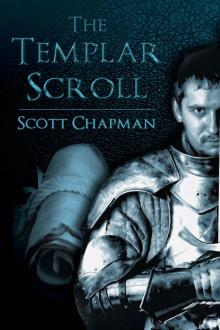 The Templar Scroll: Book six in the series
The Templar Scroll: Book six in the series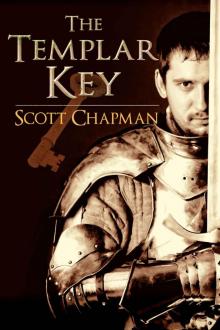 The Templar Key, By Number One Author (Peter Sparke Book 3)
The Templar Key, By Number One Author (Peter Sparke Book 3)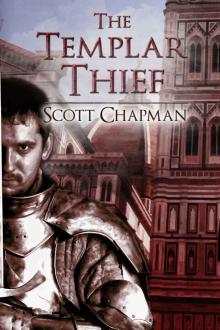 The Templar Thief: Peter Sparke book 4
The Templar Thief: Peter Sparke book 4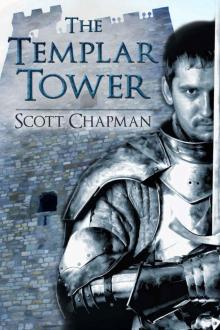 The Templar Tower: Peter Sparke Book Five
The Templar Tower: Peter Sparke Book Five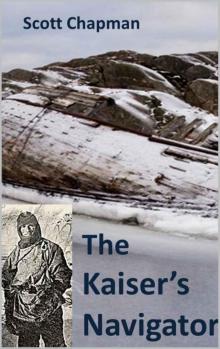 The Kaiser’s Navigator (Peter Sparke Book 2)
The Kaiser’s Navigator (Peter Sparke Book 2)